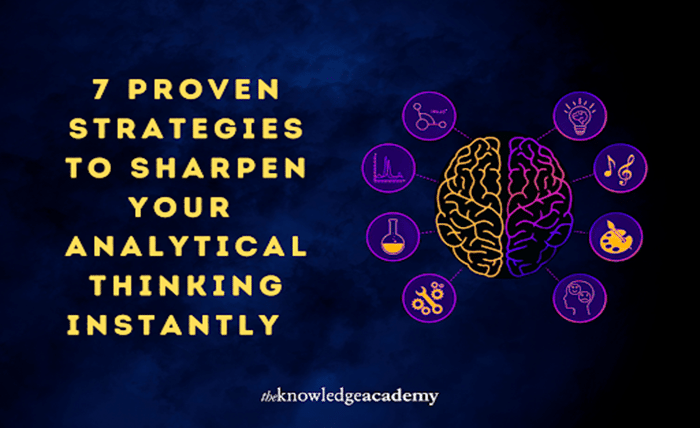7 Proven Strategies to Sharpen Your Analytical Thinking Instantly

Whether you aim to pursue a Leadership Certification to advance your career or increase your Analytical Thinking skills, developing the capacity to break down data and solve problems is essential in the modern workplace. Effective leadership and strategic planning depend on wise, data driven judgments made through a.nalytical thinking.
Here are seven strategies to improve your analytical skills immediately if you are ready to sharpen your mind and elevate your performance.
Strategies to Boost Your Analytical Thinking Skills
Developing great analytical skills does not have to be complicated. You can enhance your ability to break down information, solve problems, and make informed decisions immediately with a few targeted techniques.
Here are seven proven strategies to get you started:
Ask the Right Questions
The foundation of analytical thinking is your capacity to ask insightful questions. When confronted with an issue, start by breaking it down. Do not rely solely on surface level facts. Consider asking yourself questions like:
- What is the actual problem here?
- Why is this occurring?
- Who is affected?
As you dig deeper, the scenario becomes clearer, revealing details you may have previously overlooked.
Gather and Organise Your Information
Great intellectuals know that not all knowledge holds the same value. To hone strong analytical abilities, focus on compiling pertinent and trustworthy material. Consider:
- From which sources can I find the most reliable information?
- What is necessary for understanding this problem?
- How can I present my findings clearly?
Use notes, lists, or digital tools to organise your sources. Separating the important from the irrelevant will help you make wise decisions without relying on insufficient knowledge.
Challenge Your Assumptions
Each of us brings unique assumptions and biases. Analytical thinking requires questioning these ideas. Reflect on:
- Is my perspective based on evidence or assumptions?
- What might someone with a different viewpoint say?
Being receptive to new ideas and information enhances analytical skills and increases flexibility and open-mindedness.
Practise Breaking Down Complex Problems
Analytical thinking sometimes calls for breaking down complex problems into smaller, manageable chunks. This “chunking” technique allows you to tackle each component separately. Ask yourself:
- What are the main components of this issue?
- How does each component connect to the others?
- Are there any dependencies among the parts?
Focusing on each component individually will help you quickly understand the overall situation. Applying this method to daily tasks, from project planning to organising a major event, can help develop your capacity for analysis and handling complex problems.
Apply Critical Thinking Techniques
Critical and analytical thinking go hand in hand, each enhancing the other. Try applying strategies like:
- Ask “why” five times to identify the root cause of a problem.
- Consider the Strengths, Weaknesses, Opportunities, and Threats to guide your decision making.
These techniques provide a structured way to review information, allowing you to explore different directions and make informed choices. Regular use of these methods will improve both your critical and analytical abilities.
Embrace Mistakes as Learning Opportunities
Analytical thinking is about learning, not about always being right. Mistakes are excellent learning opportunities. When something goes wrong, analyse what happened without judgment. Ask yourself:
- What went wrong, and why?
- How can I prevent this in the future?
Reflecting on your mistakes helps you develop resilience and sharpen your analytical skills for the future.
Keep Your Mind Active with Puzzles and Games
Developing analytical thinking can sometimes be as entertaining as working on riddles, playing strategic games, or solving puzzles. These activities engage various aspects of your mind and support creative problem solving. Ask yourself:
- What patterns do I see?
- How can I move more strategically?
- Are there any links between different ideas?
Over time, you will notice an improvement in your ability to spot patterns, make strategic decisions, and connect ideas faster.
Conclusion
Analytical thinking is like a muscle; the more you practise, the stronger it gets. These guidelines can help you develop into a sharper, more perceptive thinker quickly: ask the right questions, organise information, challenge assumptions, and embrace challenges.
Remember, developing analytical skills largely depends on practice and a willingness to view issues from multiple angles. A course from The Knowledge Academy can help you further develop your analytical abilities and enhance your knowledge and experience in this field.




